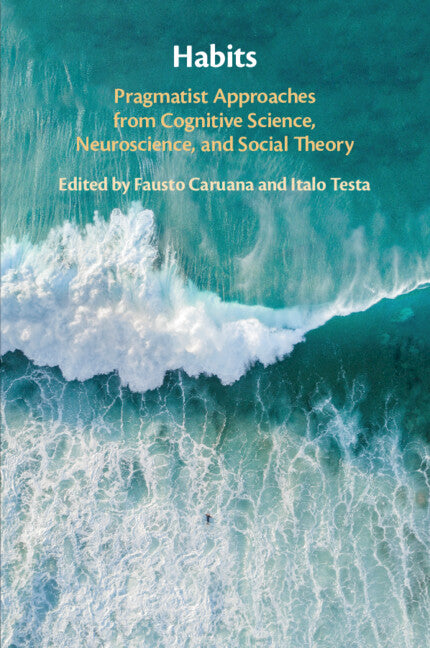Freshly Printed - allow 8 days lead
Couldn't load pickup availability
Habits
Pragmatist Approaches from Cognitive Science, Neuroscience, and Social Theory
This pragmatist interpretation of habits provides a unifying concept for 4E cognitive science, neuroscience, philosophy, and social theory.
Fausto Caruana (Edited by), Italo Testa (Edited by)
9781108736367, Cambridge University Press
Paperback / softback, published 4 August 2022
478 pages
22.6 x 15.2 x 2.6 cm, 0.679 kg
'Philosophers and neuroscientists have long treated habitual actions as reason's shadow, as rigid mechanical routines. This stunning collection of essays excavates a rich counter-history of the neurophilosophy of habits. The contributors combine rigorous original scholarship with ambitious updates of the great pragmatist philosophers' subtle views on embodied cognition and human plasticity.' John Sutton, Professor of Cognitive Science, Macquarie University, Australia
This book evaluates the potential of the pragmatist notion of habit possesses to influence current debates at the crossroads between philosophy, cognitive sciences, neurosciences, and social theory. It deals with the different aspects of the pragmatic turn involved in 4E cognitive science and traces back the roots of such a pragmatic turn to both classical and contemporary pragmatism. Written by renowned philosophers, cognitive scientists, neuroscientists, and social theorists, this volume fills the need for an interdisciplinary account of the role of 'habit'. Researchers interested in the philosophy of mind, cognitive science, neuroscience, psychology, social theory, and social ontology will need this book to fully understand the pragmatist turn in current research on mind, action and society.
Introduction: the pragmatist reappraisal of habit in contemporary cognitive science, neuroscience, and social theory: introductory essay Italo Testa and Fausto Caruana
Part I. The Sensorimotor Embodiment of Habits
Section 1. The Neuroscience of Habits: 1. Habit formation, inference and anticipation: continuour themes in a pragmatist neuroscientific perspective Jay Schulkin
2. Habits and self: a temporal view Georg Northoff
Section 2. Habits and Emotions: 3. Emotional Mirroring Promotes Social Bonding and Social Habits: An Insight from Laughter Fausto Caruana
4. Emotions, habits, and skills: action-oriented bodily responses and social affordances Rebekka Hufendiek
Section 3. Habits and Skills: 5. What the situation affords: habits and heedful attitudes in skilled performance Katsunori Miyahara, Tailer G. Ransom and Shaun Gallagher
6. Swim or sink: habit and skilful control in sport performance Massimiliano L. Cappuccio and Jesús Ilundáin-Agurruza
Part II. The Enactment of Habits in Mind and World
Section 4. Habits and the Background of Action: 7. The backside of habit: notes on embodied agency and the functional opacity of the medium Maria Brincker
8. Habit, ontology, and embodied cognition without borders: James, Merleau-Ponty, and Nishida Jonathan McKinney, Maki Sato, and Anthony Chemero
Section 5. Habits, Intentionality, and Language: 9. Clarifying the character of habits: understanding what and how they explain Daniel D. Hutto and Ian Robertson
10. Habits, meaning and intentionality: a Deweyan reading Pierre Steiner
11. Language, habit and the future Elena Clare Cuffari
Section 6. Habits and Moral Life: 12. Moral habit Mark Johnson
13. Habits of goodness: how we come to be virtuous without moral laws Teed Rockwell
Part III. Socially Embedded and Culturally Extended Habits
Section 7. Habits, Human Development, and Social Practices: 14. Growing minds: pragmatic habits and enculturation Richard Menary
15. 'Habit is thus the enormous flywheel of society': pragmatism, social theory, and cognitive science Stephen Turner
16. Habit and the human lifespan: toward a Deweyan account of aging and old age Shannon Sullivan
Section 8. Habits, Cultural Artifacts, and Aesthetics: 17. Habits and enculturated mind: pervasive artifacts, predictive processing and expansive habits Joerg Fingerhut
18. Brain, body, habit and the performative quality of aesthetics Vittorio Gallese
Section 9. Habits, Social Ontology, and Institutions: 19. A habit ontology for cognitive and social sciences: methodological individualism, pragmatist interactionism, and 4E cogniton Italo Testa
20. Social ontology between habits and social interactions Roberto Frega
21. Social reproduction, feminism, and Deweyan habit ontology Fredico Gregoratto and Arvi Särkelä.
Subject Areas: Neurosciences [PSAN], Perception [JMRP], Cognition & cognitive psychology [JMR], Cognitivism, cognitive theory [JMAQ], Philosophy: aesthetics [HPN], Philosophy of mind [HPM]


